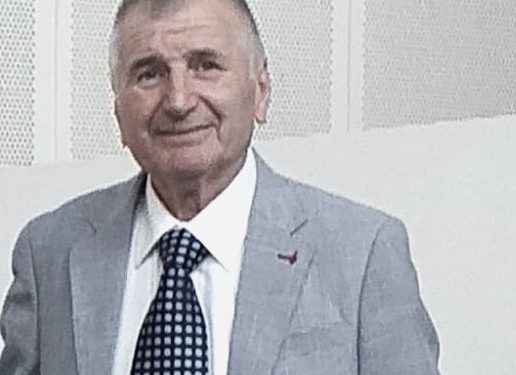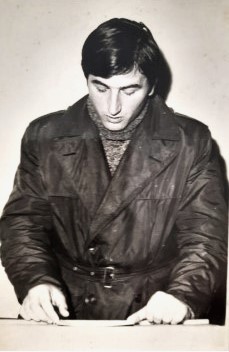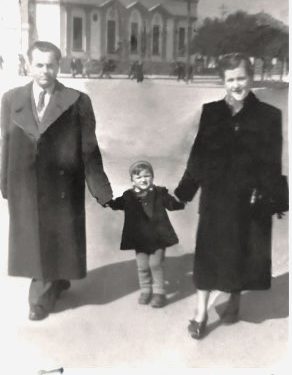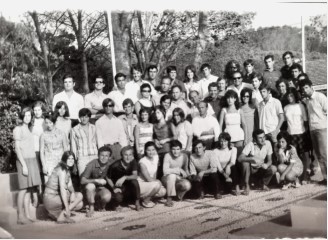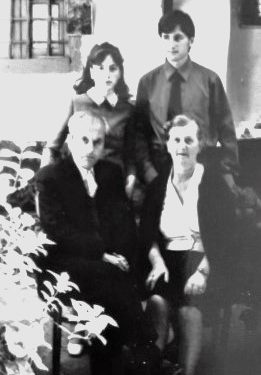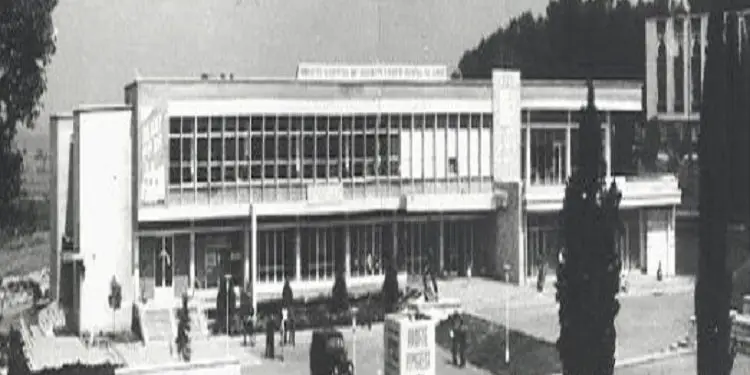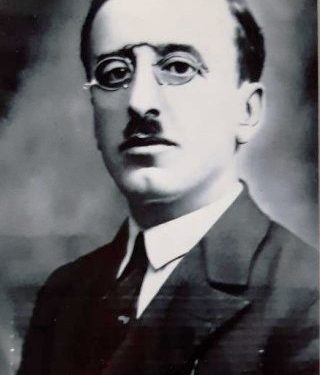By Nestor Topencharov
The second part
THE DRAMA OF LIFE
(THE STORY OF A FAMILY)
I dedicate this book to: All fellow sufferers. Their families. And in particular, to people who did not have the opportunity to tell the odyssey of life, during the communist dictatorship.
FORE SAYING
Memorie.al / I was born in the city of Korça, on October 22, 1953. I left Albania in October 1990, after we were given the right to repatriate to Yugoslavia (now North Macedonia) ). In June 1992, I emigrated to Italy, where I still live today. Although I have been away for 32 years, I did not cut ties, as Albania was the country of my birth, where I spent 37 years, and that part of my blood is Albanian. Years later, the ties with Albania were strengthened, as I also took my wife from Durrës. We came every year on vacation, but the short time of our stay meant that many contacts were cut off. However, true friends and comrades remained forever in my heart.
In the last three years, I did not have the opportunity to visit Albania. But during 2022, I came several times. My commitment on the one hand and the coincidence on the other, made it possible for me to re-establish connections with friends and colleagues whom I had not seen for decades. Knowing my past, some of them advised me to write down what had happened in my life. At first, this idea seemed like a utopia to me, since even though I had been a good student; I had no inclination towards drafting. Then I reflected. I would just write my story, true events, where not much inspiration was needed. Perhaps a writer would know how to present these events, as a true pen artist knows. While I will write them, without many descriptions: briefly, simply, naked, as they happened.
Something else that pushed me even more to write this book was an interview on TV Klan, which I saw in October of this year, directed by the well-known journalist Blendi Fevziu. I didn’t seek revenge. But I didn’t even have justice. With the help of this book, I will make known to the Albanian public opinion, the role of the individuals who contributed to my suffering and that of my family. And today, I am putting my finger on these “beings”, not for the task they had, but for the way they performed it. I will start my writing with my grandfather, from my mother’s side, to continue with my father, where I will touch on the most important moments of their lives. This will help the reader to know my background.
Then I will also talk about myself. In this book I will also tell some events, one more dramatic than the other, that happened to people I had the honor of knowing. I am glad that many books have been published on the suffering and persecution of “enemies of the people” and their families in internment camps and prisons during the communist dictatorship. I was able to read some of these works. I believe that this book, in a modest way, will contribute to know even more the inhuman methods of the State Security, the way they created accusations and how they destroyed people and families to keep the people under terror.
The author.
December, 2022
FIRST CHAPTER
In February 1957, my grandfather passed away and my parents moved to Korça, where they had a house. In May of this year, my sister, Ivana, was born. A few months later, the grandmother went to Bulgaria, to her son. Years passed. I spent my childhood and part of my youth very well. Father, often during the summer period, when he went to work, he took me with him. After work, he spent all the time with me. He tried to convey to me what was most positive and human. Although I was still very young, for me it was a very important period that connected me a lot with my father. I was doing very well with lessons. With commendation sheet. The only thing I missed was my relatives. Friends often told that their uncle had come, that they had gone on vacation to their uncle, aunt, grandfather… that they had all been together at weddings, birthdays, for the New Year’s party… etc. As for me, I had them across the border. But this thing, my father missed more.
I remember when we were returning by bus to Korçë, during the descent of Qafë Thana, to the village of Lin. My father would show me the direction from the lake, where his hometown, Ohrid, was located, where in the evening the lights of the city could be seen. He was so close, but at the same time, so far away. 40 years. At different times, at intervals of several years, the father repeated the request for repatriation. But they were always rejected because of the political situation.
In 1972, I finished high school with very good results. I applied to the Faculty of Medicine, since my desire was for this profession since I was young. Study rights were issued from the beginning of August. This month, through the city’s Youth Committee, I went as a leader to the pioneer camp in Durrës. In those years, each shift, the camp lasted 28 days. There I met many young people who, like me, had come with the task of being a leader. A good part worked in education, some in the theater, others graduates, especially from Tirana, also those waiting for the right to study. I respectfully remember the camp director, Pëllumbi.
Even with the camp doctor, Dr. Flag Topi, we got to know each other well after he took care of a health problem that I had. I met him many years later, when I was traveling with my wife from Durrës to Trieste. He introduced us to his nephew, a very educated boy, at that time a medical student, who was escorting him to the ferry. The trip to Trieste lasted more than 24 hours and this boy stayed with us.
The month of August 1972 has remained unforgettable for me. I was 19 years old, in the prime of my youth. I was located in one of the most beautiful places, on the beach of Durrës. The area where the pioneer camp was built was adjacent to the convalescence of the Ministry of Interior and Defense. During the day, I was busy with the 30 children of the company, who had trusted me. They were in the fourth grade, girls and boys. They were very lively and to keep order, I had to impose myself quite a bit. At first I found it a little difficult, until I got to know them, as I also lacked experience. But within a few days everything worked and we were all satisfied. In that pioneer camp, the organization was perfect, especially when the children would enter the sea. During the day, many activities took place, which made the holidays very pleasant.
In the evening, after the children went to sleep, we were free. While in one of the convalescences, a film was projected in an open environment, in the other, Italian and English music blared on the dance floor. Foreign tourists, who frequented the Durrës beach, walked everywhere. I felt satisfied when I talked with someone who wanted to know about the pioneer activities we were doing in the camp. The English language, which I had studied in high school, helped me.
A few days before the camp season ended, my father came to see me. That year it was experimented for the first time that the study rights would be given by the neighborhoods. When at the beginning of the month the names of the high school students who would go to the university came out, I didn’t figure it out. Some of my father’s friends, in confidence, had told him that someone who was influential in the neighborhood had burned my candidacy.
This was a person with a lot of influence, who in his youth had conflicts with my uncle, who then wanted to punish my grandfather, but failed because he could not present evidence. Now that he was given this opportunity, he did everything possible to harm me. This evil soul was called Vangjo Vangjeli, director of the city’s Palace of Culture. Together with his wife, Mary, who was the leader of the bloc, in the later period, they played a very negative role towards me and my family.
Then the father went to the Party Committee, where he asked for a meeting. After explaining the reason, they promised to look into my case. It didn’t take long and with the second group of study rights, I was entitled to the Faculty of Veterinary Medicine, Zootechnics branch. When father came to the camp, he informed me about everything he could. It was the first year that Zooteknia was separated as a separate branch and I had no idea what it was all about. My father explained to me something about this profession, from what he had been told.
But I did not feel anything at this moment, as my dream had been different. After seeing my disappointment, he calmed me down and suggested that we go to Tirana, where he would try to change my field of study. – “I want to do everything I can as a parent,” he told me, “so that tomorrow you don’t think that your father didn’t do anything for you.” Then after I received permission from the director and how I greeted the children of the company and many of the other leaders, we left for Tirana.
When he worked in the ministry, the father had a colleague, the architect Valentina Pistoli. At that time, her husband was the dean of the Faculty of Medicine. Then we went to Dr. Spase Trimchev, an influential doctor, who was a friend of my uncle, Robert. To the former Albanian ambassador in Sofia (at this time retired), who had been friends with the grandmother. To the Head of the Department of Topogeodesy, whom my father knew well (that even with some engineering, I would be satisfied).
Everywhere we went, it was in vain, since that year it was impossible to change faculty. I preferred not to lose the year and we went to the Agricultural Institute, where I registered to start my studies. I started my first year with no desire to learn. At first it was the general subjects, but then as time went by and with the introduction of vocational subjects, I liked Zootechnics. Even in the faculty, I achieved very good results in lessons.
I liked student life. During the first year I lived “it”, which then hit me: music, fashion, “foreign” beauty. Although the Agricultural Institute was outside the city, in Kodër-Kamzë, my friends and I often went to Tirana. We enjoyed walking around town. We used to have dinner at the restaurant “Drini” (formerly “Vollga”), when we had a few ALL left over. I often went to the cinema as well as the theater. In the Opera and Ballet Hall, I have seen the operas; “La Boheme” and “Traviata” with soprano Nina Mula and tenor Gaqo Çako. I also liked ensembles, of which, in those years, I saw several performances.
Regarding requests for repatriation, the father made the last attempt, in 1972. For the request he had made, he was asked to appear at the Secretariat of the Presidium of the People’s Assembly, where he was informed that; from the Albanian side, there was no problem. It was the Yugoslavs who did not accept it. In the conversation that took place, he asked if he could go to the Yugoslav embassy to clarify the problem. After receiving approval from the Secretary of the Presidium, the father wrote a letter to this embassy, presenting the request. After a few weeks, in their response, the embassy invited the father to appear. During the meeting, they were told that from the Yugoslav side, the return of our family to Ohrid, there was no obstacle.
The only request was that first the Presidium of the People’s Assembly had to take away our Albanian citizenship and then the other actions for repatriation would be done by them. This answer was also sent to us in an official way, by mail, which the father presented to the senior official of the Presidium. Then when it was seen that the mask of the justification had been removed, the Secretary informed the father that they would never allow children born and raised in Albania to go outside of Albania.
The year 1976 came. We had no illusions about going to Yugoslavia for 3-4 years. Father retired in March. We were building the house with the Atelier. Ivana was also good at lessons and as the second child; she had the opportunity to study. I had the appointment in Tirana, where I liked to live. In the month of April, our course had programmed a several-day visit to the livestock centers of the Korça district. Charged by the faculty, I came to my hometown a few days ago to book hotel rooms.
After organizing everything, on the appointed day, I waited at the bus agency, the professors and fellow students and accompanied them to the hotel structures. In the next 3-4 days, we visited several advanced livestock economies. We also went to Maliq. Everywhere we met with specialists, veterinarians and zootechnicians, who introduced us to their experience and results. This tour was very successful. Everyone, professors and students, were very satisfied. It was the last day in Korça, and I had invited some of my friends for lunch. We had a good time. They were also satisfied by the conversation with the father.
In the late afternoon, we were taking a walk on the boulevard. It was April 8, 1976. The weather was very nice and the boulevard was full of people. I felt very happy. The next day we would return to Tirana. After a few weeks, the exams would start and then the choir and work, where I would go out in life. Friends also talked about plans after college. During the walk, in an instant, I see the sister who was coming in my direction. I hang up and find out those two “Gaz” cars of the Internal Affairs Department, with 8-9 Security officers, had come to the house, and after they had checked, they had taken my father. I couldn’t believe my ears. It seemed as if the whole world had fallen on my head. I briefly turned to my friends, who noticed the change in my facial expression.
Concerned, they asked me what had happened. I told you that my father was not feeling well and that I would inform him later about his condition. They wanted to accompany me, but I stopped them. When I got home, I can’t describe the sight. On the one hand, drowned in tears, on the other hand, disorder, destruction, clothes thrown here and there, open drawers, clothes racks made a mess, sofas displaced from the place. That house that had always been neat and clean, where everything was in its place, had now turned into a battlefield. My sister, then in her late nineties, was traumatized.
At that moment I realized that I was the one who should take the situation in hand. After I calmed them down, we started to organize the house. Then my mother gave me the report, which was made for the control. Some gold coins were registered there, which were seized in one of the other controls. Two of the employees of the Branch, who remained in his memory, were; the first a man around 35, arrogant, short and red too. He seemed to be the one running the round control, with a red face and very thick earlobes that was constantly giving orders. The other was a young man, about my age, who was elegantly dressed and gave the impression of a man of school.
Then I went to the hotel and told my friends that we had hospitalized my father, but to keep calm that the situation was under control. I informed him that I would stay at home for a few days until his health stabilized. I wished him good luck for the next day and we said goodbye. At home, in the evening, no one would open their mouths to eat, so we went to sleep. For me, this was the worst night of my life. I slept in pieces. More without sleep than with sleep. Bad dreams that made me jump out of bed. After falling asleep, I realized that the reality was worse.
In life, I could think of anything, but I never dreamed that my father would be arrested! I had the idea that only those who broke the law went to prison. From 6:00 in the morning, when I had just fallen asleep, I was woken up by a knock on the door. I dressed immediately, hoping to see my father. From the other room, I heard that mom also got up. When I opened the outer gate, I saw my friends, who had returned from the hospital. They asked me about my father’s health and I was told that no one knew anything about this case. I tried to confuse them with the paving department, but I am a man who does not know how to lie. I don’t know how much they believed me. Then he left, as the bus was leaving shortly.
I felt very bad that I did not tell you the truth. But in the state I was in, at that moment, this seemed like the way out. When I entered the room, I saw that my mother and sister thought it would be my father. But all three of us were disappointed. I waited for 9:00 a.m. to go to the branch. I didn’t know who to turn to, who to ask. I was turning 23 years old and had not seen the gate of Dega until then. I knew that the complex of the Department of Internal Affairs, in Korça, was composed of 3-4 palaces built in the time of Italy. I had heard that they were offices, but I did not know that the underground floors were pre-incarceration dungeons. An investigator had signed the minutes they had left at home. His name was Irakli Koçollari. At least I had a name.
After taking my details, the guard officer told me to wait in the room opposite the counter. After a few minutes, a policeman came and accompanied me to the stairs of one of the buildings. Two civilians were waiting for me there. It was exactly the two of them that remained in Mom’s memory. The short one, the head of the investigation, Reshat Leskaj, was introduced, while the other one was the one in the brown suit, who had signed the minutes. The chief explained to me that they had taken the father, for the accusations that had been made against him, but we should stay calm, that they would clarify everything. To have faith in the party. While having this conversation, he suddenly grabs my left hand and checks the brand of my watch. After seeing what he wanted, he let go of me easily. My watch was an old Swiss brand that my grandmother had sent me in 1966, after the death of my great uncle.
At that moment I did not understand that action, but later I was clear about the reason for this control. Last evening, when we were tidying up the house, my mother noticed that our stamp album was missing. This was a catalog-album, which included many stamps of the countries of the world and I believe it was published around the 30s of the 20th century. The name of the state, the photo of the first stamp of this state, the year and the number of stamps of the series, and all the other series issued in the future, were written there. This catalog was filled with squares where the philatelist placed the corresponding stamps. When I was eight years old, I started collecting stamps. I also participated in the philately circle at the Pioneer House, where the leader of the circle was the philatelist, Prof. Miço Kaçaku, who gave us a lot of knowledge about this field.
He told us about the rare and valuable stamps. Among others, for the first Albanian stamp. We had inherited this album from my grandfather and my mother did not give it to me, since I was still small and could exchange stamps with my friends, which I did not know their value. Several times in her presence, I was given the opportunity to see this rich album. Among the other stamps, I also saw the first Albanian stamp, which the professor had told us about. When I went to high school and then to college, the desire to deal with philately left me, while the album always remained in its place, in a drawer of the clothes rack.
The seizure of the album did not result in the kept minutes. That morning, in Dega, I asked Reshat about this thing we were missing. Before finishing the speech, Irakliu intervened and told me: – “It will be returned to you”. He did return it after a few months, but the album had left blank pages. Over 80% of the stamps were gone. With them, the first Albanian stamp also disappeared. When I returned home, I hoped that, as I was told, things would clear up and my father would be released. I decided to stay at home for a few more days, before returning to Tirana, where the exams began next month.
Somewhere above, I mentioned that our house was being restored by the Korça Atelier, as it was located near the center (next to the “Unknown Soldier” monument) and was a characteristic building of the old town. The house consisted of two two-story apartments, separated by an inner courtyard, where one of the two had a basement. At the time of the father’s arrest, the inner building with the basement had been rebuilt, while work was being done on the upper floor of the other. After what happened, the number of workers was reduced to 1-2 people and the works slowed down a lot.
We were in the downstairs room having lunch. Even the worker who was working had left, when we hear the sound of a car stopping in front of the house. After a while, the outer door opens and the feet of two or three people are heard, quickly climbing the wooden stairs to the upper floor. We were used to the movement of workers in the house during this period of construction. But, in an instant, some strange noises are heard above our heads and immediately after, the people came down the stairs.
I got up from the table and opened the dining room door which led to an inner hallway. Opposite were the stairs leading to the second floor. Opposite I see Herakli, accompanied by two others. In each hand they carried two short, antique firearms. Weapons from the period of Turkey. After we exchanged glances, without saying a word to me, they opened the outer door and left, in the direction of the “Gaz” vehicle, which was waiting for them below. Memorie.al




